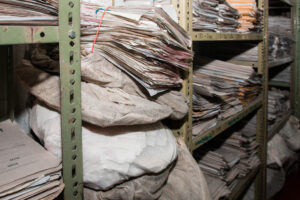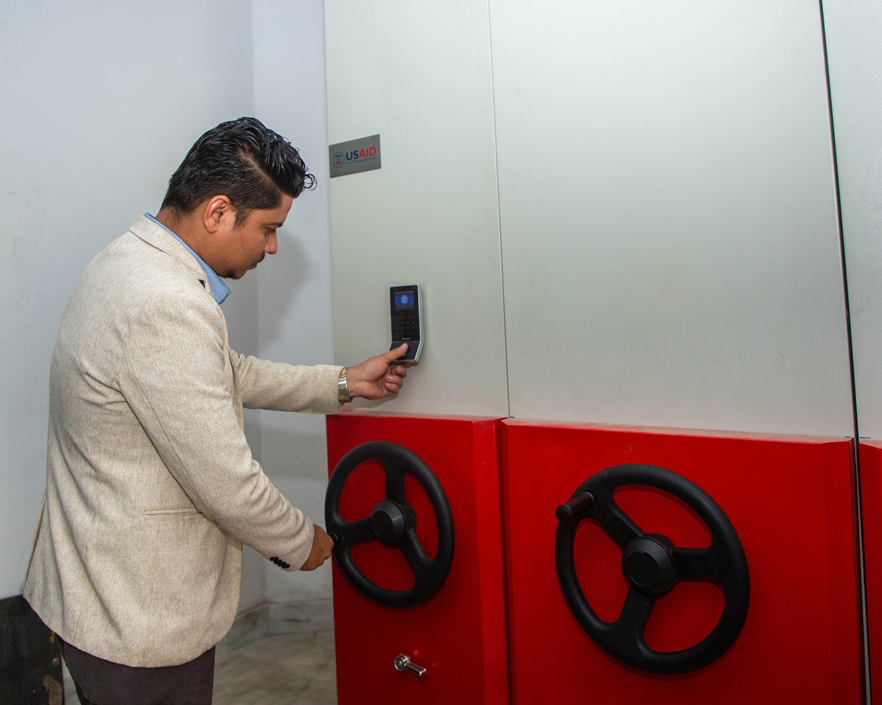Document Management Repositories Increase Efficiency at Nepal’s Department of Drug Administration
Nepal’s national medicines regulatory authority—Department of Drug Administration (DDA)—is working toward reaching maturity level 3 according to the World Health Organization’s indicator-based global benchmarking tool, which signifies a stable, well-functioning regulatory authority. The DDA’s recent self-assessment produced several recommendations for its institutional development plan. One was to create a proper central management system to securely and systematically store DDA’s thousands of hard-copy documents. DDA’s quality management system also required a system to control document flow. The documents include applications for the registration and authorization of pharmacies, wholesalers, manufacturers, and products as well as those related to inspection. Another benefit would be gaining extra space, which DDA could use to expand its service delivery. Realizing these dual benefits, DDA requested support from USAID MTaPS to install repositories with proper access control in its divisions that deal with hundreds of documents each day. USAID MTaPS agreed to help DDA implement a quality management system and achieve regulatory maturity.


Files arrangement before and after repositories installation. Photo Credit: USAID MTaPS Nepal
Installing access-controlled repositories
DDA usually receives hundreds of applications and dossiers each day which they need to store securely. Without a proper storage and indexing system, retrieving them quickly during assessment always gave hard time as the documents would be piled in thousands. The security of such documents was also an issue as there was no proper access control linked to the document. So, it was realized that the repositories would solve much of the problems.
The task was challenging from the outset as the proposed system had to fit into DDA’s building structure, and installation could hinder service delivery. The inclusion of the biometric identification feature to enhance security was a challenging task, especially considering the absence of a reference sample piece. Additionally, designing the system to accommodate different room specifications posed another significant challenge. Ultimately, after engaging in multiple rounds of discussions with the DDA, the design was finalized. The installation went smoothly until completion as the DDA continued its operations uninterrupted, apart from the pre-informed partial service halt of the initial two weeks at the pharmacy registration section, from alternate rooms within the DDA. DDA effectively communicated the contingency provision through the official notice to the service seekers, ensuring uninterrupted service delivery during the installation process. Out of five repositories, three were installed in the Drug Evaluation and Registration Division and one each at the Monitoring, Evaluation and Law Enforcement Division and Planning, Coordination and Management Division. The repositories have an access control feature for security using a biometric identification device and log data each time the repository is opened. The repositories installed at the Drug Evaluation and Registration Division have a combined capacity to hold up to 50,000 files, while each of those installed in two other divisions can accommodate up to 10,000 files. Based on the current rate of hard copy storage requirements, these repositories will have sufficient space to accommodate new applications for the next five years; in case the obsolete documents are destroyed phase-wise, enough spaces will be left for even longer.
DDA also recognized they needed additional staff to help scan and index the documents and move them out of bundles and on to secured shelves. USAID MTaPS supported DDA to hire four short-term assistants for this task. Once the transition and indexing of files into the repositories is completed, retrieval process will be easy enhancing the efficiency of the DDA staff.

Mr. Sanjeev Sharma Kattel, Pharmacy Officer, DDA, using the biometric entry to access the document repository. Photo Credit: USAID MTaPS Nepal
Mr. Sanjeev Sharma Kattel, Pharmacy Officer at DDA Industry Registration Section, expressed his excitement about using the system. He said that for years it had been difficult to store and archive thousands of physical files. Drug Evaluation and Registration Division Head at DDA also committed to making best use of the system, while Mr. Bharat Bhattarai, the DDA Director General, expressed his gratitude to USAID MTaPS for their assistance in the installation process and acknowledged that the repositories will prevent unauthorized access and enhance the service delivery.
“We did not have a document storage system before, and it was challenging to trace the approximately 50,000 documents. Now, since we have the repository system, we can strengthen the DDA documentation practices through proper access control and increase our work efficiencies. Furthermore, the short-term assistants will be of great help to transition from piles to files through this system. I would like to express my sincere gratitude to USAID MTaPS for this collaboration.” — Mr. Sanjeev Sharma Kattel, DDA Pharmacy Officer
With the repositories, visible changes are already underway at DDA. One remarkable improvement is the speed at which dossiers and application files can now be retrieved. Previously, retrieving these files from storage would take hours, if not days, and only a few staff were able to locate them due to inadequate indexing. However, with the installation of repositories and proper indexing, authorized staff can easily retrieve these documents within minutes. This has greatly enhanced staff efficiency and decreased waiting time of the clients improving the customer experience. One of the positive externalities resulting from the installation is the improved office environment which gives a good feel for the staff. As Nepal aspires to digitalize its public service delivery systems, repositories like these will be essential. The result of USAID MTaPS’ collaboration with DDA to establish this system will increase efficiency and utilization in the foreseeable future.